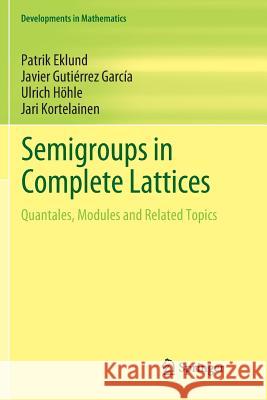Semigroups in Complete Lattices: Quantales, Modules and Related Topics » książka
topmenu
Semigroups in Complete Lattices: Quantales, Modules and Related Topics
ISBN-13: 9783030076870 / Angielski / Miękka / 2019 / 326 str.
Kategorie:
Kategorie BISAC:
Wydawca:
Springer
Seria wydawnicza:
Język:
Angielski
ISBN-13:
9783030076870
Rok wydania:
2019
Wydanie:
Softcover Repri
Numer serii:
000149980
Ilość stron:
326
Waga:
0.49 kg
Wymiary:
23.39 x 15.6 x 1.85
Oprawa:
Miękka
Wolumenów:
01
Dodatkowe informacje:
Wydanie ilustrowane











